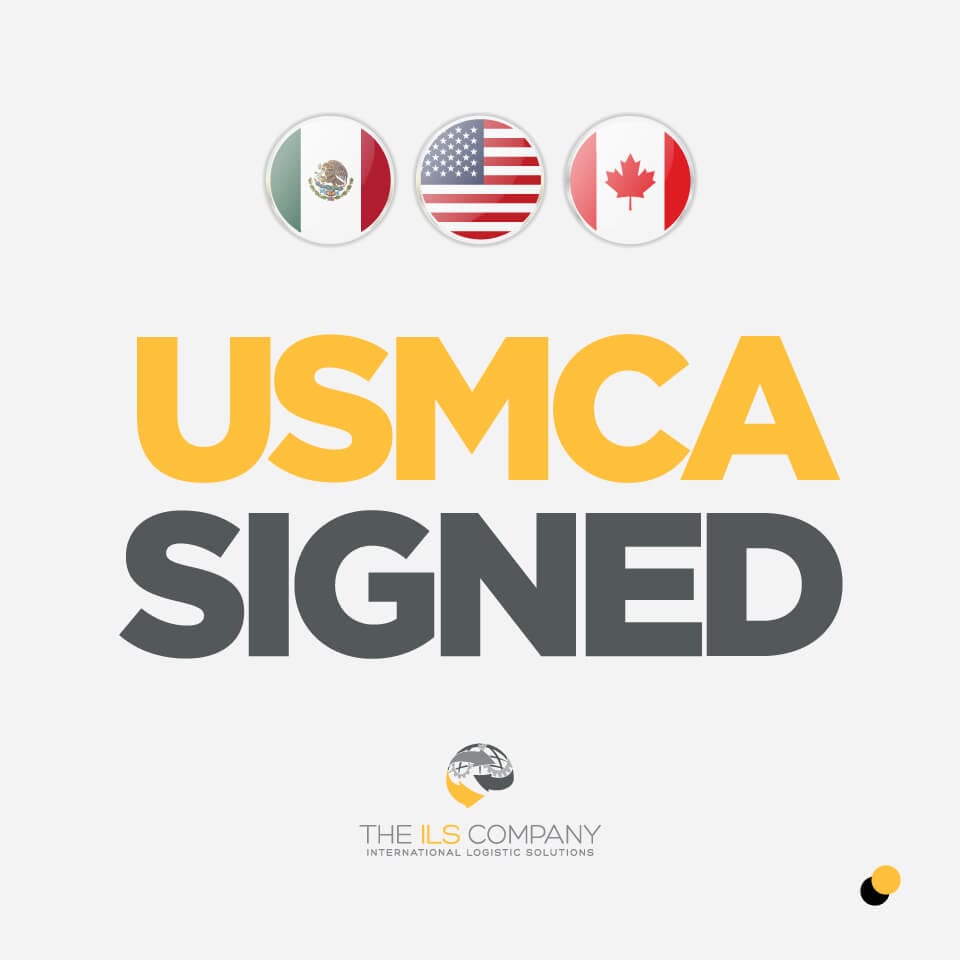
The United States recently agreed on terms with Canada and Mexico during the NAFTA (North American free-trade agreement). The USMCA is considered to be a win that will mutually benefit North American businesses, ranchers, farmers, workers, and shippers. The finalization and implementation of this agreement will improve trade by introducing more balance and reciprocity. It will also improve North America’s economy by supporting high paying jobs for the workers in America.
Mentioned below are some of the agreement’s highlights:
- Providing American workers with an equal playing field, which includes revised and improved rules of origin for trucks, automobiles, and various other products along with currency manipulation disciplines.
- Helping out agribusinesses, ranchers, and farmers of America by strengthening and modernizing North American agriculture and food trade.
- Supporting the economy through the most recent United States intellectual property protections while providing trade opportunities in the US.
Mexico has experienced significant economic development and growth in the past ten years. Because of this, countries look at Mexico as a market with limitless potential, especially in the manufacturing and commodity sectors. According to economists, Mexico’s recent economic growth has introduced some changes in trade policies and foreign markets. Because of this, companies in the United States are slowly abandoning their businesses in China and relocating to Mexico.
The reasons why a plethora of US companies are parting ways with China and favoring Mexico are quite varied and complex. However, you can sum them up by looking at the advantages of conducting businesses in Mexico. Here are some of those advantages:
Why Mexico is A Manufacturing Haven for US Companies
Before delving deep into the various advantages of conducting businesses in Mexico, it is vital to discuss why the country’s manufacturing industry is its crown jewel. If we go by numbers, Mexico is part of an elite list of countries with the best global manufacturing economies. Here are a few things that Mexico specializes in.
- Automobiles
You may be astonished to learn that Mexico is amongst five of the best auto producers of the world. Here is a list of renowned auto manufacturing plants in Mexico:- Volkswagen
- Toyota
- Nissan
- Mazda
- Kia
- Honda
- GM
- Ford Motor
- FCA
- Audi
- Electronics
Mexico has the sixth biggest tech sector in the world. The country makes more than 70 billion on an annual basis. Plus, the 20 percent annual growth rate only seems to be growing with time, showing no signs of slowing down. - Aeronautics
In comparison to the United States, Mexico’s aerospace industry is slightly more competitive. - Medical Devices
Mexico has the second biggest market for medical devices in all of Latin America. It is only second to Brazil. Mexico also entails a twenty percent cost advantage for the United States market.
It took more than a decade’s worth of progress for Mexico to become a manufacturing powerhouse. It all started with NAFTA, as it helped to revolutionize the way modern economies would work. As time progressed the USMCA also made significant contributions to strengthen Mexico’s chances of becoming an attractive foreign investment opportunity
USMCA
The NAFTA 2.0 imposed by President Trump encourages companies to start manufacturing in Mexico instead of Asia. The updated version is also referred to as Rule of Origin.
Since most Mexican manufacturing operates over the seventy-five percent threshold, a large number of analysts forecast more companies from America to transfer a small part of their manufacturing practices into Mexico.
How US Companies Benefit by Conducting Business in Mexico
Whenever companies decide to conduct their business in other countries, the first thing they have to analyze is the cost. Most companies concluded that Asia would be the most cost-effective destination for doing business in the past. Things have changed quite a bit now as Mexico is gaining the upper hand with each passing day. Here are some reasons why US companies now choose Mexico to do their business:
Low Costs of Labor
Although USMCA provisions allow laborers in Mexico to make unions, the country’s labor costs are still quite cheap when it comes to developed countries. This element also creates one of the biggest cost disparities of conducting business in comparison to the United States.
The disparity in pay becomes greater when we analyze the manufacturing wages of Mexico and the United States side by side.
Hourly Average in Mexican Manufacturing
2.70 Dollars per hour. These rates have almost been stagnant for more than ten years.
Hourly Average in American Manufacturing
30 Dollars per hour. These rates are rising rapidly and show no signs of slowing down in the future.
Quite a few American companies try to maximize their cost-saving efforts for heavy labor-intensive products. Although Mexican workers, in some cases, are not able to completely match the efficiency of American workers, the added time costs are significantly lower than US labor costs.
Taking Advantage of Mexico’s Emerging Market
There is no denying that the economy of Mexico is booming due to the foreign investment influx. However, the fact remains that the country’s market is still in an emerging phase. Whoever beats the rush and takes advantage of the distinct opportunities can reap the benefits of conducting business in Mexico. Some of these benefits are:
- Lower competition
- Governmental Support
- Low costs of labor
- Restricted market sophistication
Lower Operational Costs
As discussed earlier, the cost of doing business and shipping in Mexico is significantly cheaper than in the United States. You can make major cost savings in the following areas:
- Hiring management staff
- Leasing buildings for your company’s operations
- Hiring labor
- Electricity, natural gas, and water service
Close Proximity to the United States
Although business owners will need to leave their country to reap cheaper costs for input, Mexico’s close proximity to the US reduces logistical woes by tenfold. The country’s geographical location makes shipping and transportation of goods way easier. Furthermore, there are no time zone-related problems, which reduces all the hassles that businesses face in Asia.
Are you ready for the USMCA?
We make freight shipping to-or-from Mexico easy!


